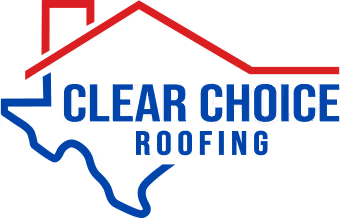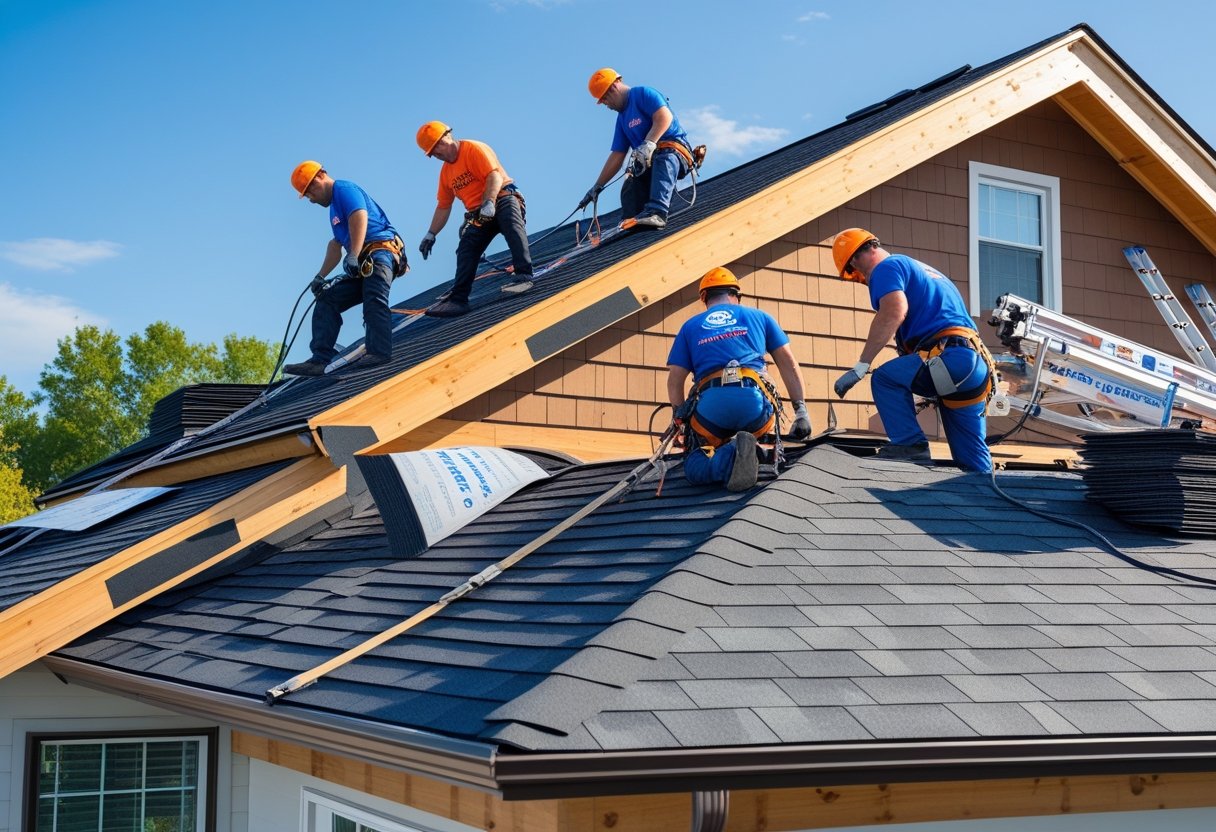When you're picking a roofing warranty, the big thing is to check exactly what it covers—materials, labor, or both—and how long that coverage sticks around. A solid warranty shields you from big repair bills if materials fail or the job's botched. Usually, you'll need to handle regular roof maintenance to keep everything valid.
Work with a roofing company that stands behind its warranties and uses brands you recognize. At Clear Choice Roofing, we offer some of the strongest warranties out there. It's smart to look for clear terms about what you need to do for upkeep and repairs—no one likes nasty surprises if something goes wrong later.
This guide should help you get a grip on the basics so you can choose a warranty that actually protects your home and wallet.
Understanding Roofing Warranties
A roofing warranty covers you if something goes wrong with the materials or the way the roof was put on. It lays out what’s included and for how long. If you know these details, you’re less likely to get caught off guard.
Types of Roofing Warranties
You’ll run into two main types: manufacturer warranties and workmanship warranties. Manufacturer warranties cover problems with the roofing materials themselves—think shingles or metal panels. Depending on the product, these might last 20 to 50 years.
Workmanship warranties, on the other hand, cover installation mistakes. The roofing contractor provides these, and they usually last anywhere from 1 to 10 years. If your new roof leaks because it was installed poorly, this warranty should have your back.
Some manufacturers use prorated warranties, where coverage drops off over time, while others offer non-prorated warranties that keep full coverage for the entire period.
How Roofing Warranties Work
Warranties only cover the issues spelled out in the fine print. If your shingles crack because of a material defect, the manufacturer might replace them. But if a storm, accident, or neglect caused the problem, you’re probably out of luck.
To keep your warranty good, you’ll need to take care of your roof—regular inspections and quick repairs are a must. Using a certified roofer like Clear Choice Roofing helps a lot.
If you spot a problem, let your warranty provider know right away. Dragging your feet can get your claim denied. Always check your warranty so you know what’s expected.
Key Terms Defined
Coverage Period: How long the warranty lasts. Material coverage might be 20-50 years; workmanship is usually less.
Exclusions: What the warranty doesn’t cover—often storm damage, fading, or neglect.
Prorated Coverage: Coverage drops as the roof ages; you get less back later on.
Non-Prorated Coverage: You get full coverage for the whole period.
Void: The warranty’s canceled—usually because of unapproved contractors or skipped maintenance.
Clear Choice Roofing walks you through all this so you know your coverage and can actually rely on it.
Core Elements of a Quality Roofing Warranty
A decent roofing warranty spells out how long you’re covered, what parts of the roof are included, and whether you can transfer it if you sell. It should also explain how repairs or replacements are paid for, so you’re not left guessing about costs.
Warranty Duration
Warranty length tells you how many years you’re protected. Often, there’s a split: materials might be covered for 20 years, but labor for only 10.
Longer warranties sound reassuring, but always check what’s actually included at each stage. Some require regular maintenance to keep the warranty alive.
Clear Choice Roofing offers warranties that follow industry standards and make sure you know what you’re getting.
Coverage Scope
A good warranty should clearly list what’s covered. Usually, this means materials like shingles, flashing, and underlayment. Some also include labor if repairs or replacements are needed.
If your warranty only covers materials, you could end up paying for installation or repair work yourself. That’s not ideal.
Check for terms that include defects, leaks, and damage from bad installation. Be wary if the warranty leaves out key parts or is vague about what’s excluded.
Transferability
Can you pass your warranty on if you sell your house? A transferable warranty can bump up your home’s value since the new owner gets coverage too.
Some warranties don’t allow transfers, and others only let it happen once or twice. Always ask about any fees or steps to make a transfer happen.
With Clear Choice Roofing, you’ll often get a warranty that can transfer, which makes your investment a bit more flexible.
Prorated vs. Non-Prorated Coverage
Warranties might be prorated (coverage goes down over time) or non-prorated (full coverage the whole way). For example, at year 15, a prorated warranty might only pay for half of a repair.
Non-prorated warranties are better in the long run—they’ll cover the full cost as long as the warranty’s active.
Some warranties start out non-prorated for a set time, then switch to prorated after. Make sure you know how claims will be paid before you sign anything.
Manufacturer vs. Contractor Warranties
Roofing warranties usually come from two places: the manufacturer or the contractor. Each covers different stuff and works a bit differently. Knowing which is which helps if you ever need service.
Differences Between Manufacturer and Contractor Warranties
A manufacturer warranty covers defects in the roofing materials. If your shingles or tiles fall apart because of a factory issue, the manufacturer should replace them. These warranties can last for decades but might require you to keep up with maintenance.
A contractor warranty covers the installation. If something goes wrong because the job wasn’t done right, this warranty kicks in. These are usually shorter and don’t cover material failures. When you go with Clear Choice Roofing, you get a contractor warranty that backs up the work.
Which Warranty Takes Precedence
If you run into trouble, the contractor warranty usually comes first since it covers how the roof was installed. So, if you get a leak from poor workmanship, call the contractor. But if the materials themselves are the issue, the manufacturer warranty is what you’ll use.
Some contractors, like Clear Choice Roofing, offer strong workmanship guarantees so you’re not stuck waiting on the manufacturer. But don’t assume—always read the terms so you know what’s covered.
Combining Multiple Warranties
You might end up with both warranties at once. That’s actually good—you get a layered protection plan:
- Material warranty from the manufacturer for product issues.
- Labor warranty from the contractor for installation problems.
Hang on to all your paperwork and follow any maintenance rules, like getting regular inspections. Some warranties insist on this.
With Clear Choice Roofing, you’ll usually get a package that covers both the roof and the work, which is honestly pretty reassuring.
Exclusions and Limitations
It’s just as important to know what your warranty doesn’t cover. Plenty of things can void your coverage or fall outside the fine print.
Common Exclusions in Roofing Warranties
Most warranties skip damage from storms—hail, wind, lightning, you name it. Accidents and misuse aren’t covered either. Issues from pests, animals, or just regular wear and tear? Also not included.
Neglect is a big one. Skip maintenance like cleaning gutters or fixing small leaks, and you may lose your warranty. Damage from flooding or fire usually calls for insurance, not a roof warranty.
Situations That Void Coverage
If you let unapproved contractors work on your roof, you could lose your warranty. Always stick with certified pros.
Ignoring maintenance or letting your roof age without care is another fast way to void coverage.
Making changes or repairs without telling the warranty provider can also cancel your contract. Clear Choice Roofing helps you keep track of these rules so your warranty stays good.
Claim Process and Support
A decent roofing warranty should make it easy to get help. You want a simple claim process, quick responses, and support from people who actually know roofing.
How to File a Roofing Warranty Claim
Filing a claim shouldn’t be a headache. Usually, you’ll contact the roofing company by phone or email. Keep your warranty paperwork close—it’ll have the details you need.
You might need to send photos or set up an inspection. If your warranty requires regular maintenance, having proof helps your claim go smoother. Clear Choice Roofing guides you through the whole thing so you’re not left hanging.
Warranty Service Response Times
Fast service matters when your roof’s leaking. Look for a warranty that promises to get back to you in a few days, not weeks. Delays can turn a small issue into a disaster. Some companies promise a 48- to 72-hour turnaround after you file a claim.
Emergencies like leaks usually get faster attention than minor fixes. Clear Choice Roofing aims for quick responses because, honestly, waiting around with a leaky roof is the worst.
Customer Support Quality
Good support means you talk to real people who know what they’re doing. You should feel comfortable asking about coverage, repair options, or next steps. Honest, straightforward answers go a long way.
Some companies offer online portals or have teams available during business hours. Check if your provider does phone, email, or chat support. Clear Choice Roofing tries to keep things friendly and professional, so you get answers without the runaround.
Maintenance Requirements and Homeowner Responsibilities
Your roofing warranty usually depends on you doing your part. Regular maintenance isn’t just suggested—it’s often required. Keeping records can save you a headache if you ever need to file a claim.
Routine Maintenance Guidelines
Your roof will last longer if you check it now and then. Look for cracked or missing shingles, debris, or leaks.
Clean your gutters at least twice a year to prevent water damage. Trim tree branches that could fall or scrape the roof.
Many warranties require a professional inspection every year or two. These catch small problems before they get big. Clear Choice Roofing offers thorough inspections to help you stay on top of things.
Documentation Needed for Claims
If you notice a problem and want to use your warranty, keeping records matters. Snap photos of any damage you spot and jot down notes about when and what you checked.
Hang onto all invoices and inspection reports—these help show you followed the warranty steps. Without proof of maintenance, your claim might get denied, and that’s the last thing you want.
Let the roofing company or warranty provider know right away if you find damage. Clear Choice Roofing can walk you through what’s needed so your claim checks all the boxes.
Red Flags and Warning Signs
When you look at a roofing warranty, some details might seem minor but can really matter. You want clear terms and a solid length of coverage. Here are a few warning signs that could mean the warranty isn’t as strong as it should be.
Vague Warranty Language
If the warranty has fuzzy or broad wording, that’s a problem. Phrases like “may cover” or “subject to conditions” don’t really protect you. A good warranty spells out exactly what’s covered and what isn’t.
Look for details on materials, labor, and installation defects. If you see lots of exceptions or vague terms, you could have trouble getting repairs or replacements later. A solid warranty explains how to claim repairs and when you’re eligible.
Unusually Short Warranty Periods
Watch out for warranties that only last a few years. Most roofing materials should last 20 to 30 years, so a warranty under 10 years is a bit of a red flag. Short warranties might mean the company isn’t very confident in their work or materials.
Longer warranties usually mean better peace of mind—they tend to cover both material problems and workmanship issues. Also, check if the warranty can transfer to a new owner if you sell. Clear Choice Roofing offers some of the longest warranties around, which says a lot about their confidence in their work.
Comparing Roofing Warranties from Different Providers
When you’re comparing roofing warranties, start with what’s actually covered. Some only include materials, while others cover both materials and labor. Make sure you know exactly which parts of your roof get protection.
The length of the coverage matters too. Sometimes you’ll see 10 years on materials but only 5 on labor. Ideally, you’d want good coverage for both.
Some warranties require you to do regular maintenance or inspections to keep them valid. If you skip these, you might lose your coverage, which would be a real pain.
Don’t forget the workmanship warranty. This covers you against poor installation, but not every roofer stands behind their work with a strong workmanship guarantee. Clear Choice Roofing includes reliable workmanship coverage backed by a top brand—definitely a plus.
Here’s a quick checklist to help you compare:
Warranty FeatureWhat to Look For Coverage TypeMaterials only or materials plus laborCoverage LengthHow many years for materials and laborMaintenance RequirementsInspections or care needed to keep warranty validWorkmanship WarrantyIs installation quality guaranteed?
Choosing a trusted local roofer like Clear Choice Roofing can really make a difference. Their warranties are straightforward and designed to protect both your home and your wallet.
Ask questions about any warranty before you sign. You’ll want to know exactly what to expect if something goes wrong after the roof’s installed.
Roofing Warranty Certification and Accreditation
When you’re picking a roofing warranty, it helps to know if it comes with certification or accreditation. Certified warranties usually mean the roofer meets certain standards, which protects you by making sure the work and materials are up to snuff.
Look for warranties backed by top roofing manufacturers. These usually guarantee that the materials and labor follow strict guidelines. Clear Choice Roofing, for instance, holds the Owens Corning Platinum Preferred Contractor title. That says a lot about their standards for workmanship and service.
A certified warranty might cover:
- Roof materials
- Labor costs
- Repairs for certain defects
Some warranties ask you to keep up with routine maintenance and inspections. This keeps your warranty valid and helps you avoid headaches down the road.
Accreditation from groups like the Better Business Bureau or professional roofing associations also shows a roofer’s reliability. Clear Choice Roofing’s A+ rating with the BBB is one more reason to trust their work.
When you get a certified roofing warranty, you get peace of mind. Your roof’s protected by pros who follow strict rules and use good materials. Don’t hesitate to ask your roofer about their warranty certifications before you make a decision.
Frequently Asked Questions
A solid roofing warranty covers materials, labor, and defects—no guesswork. You’ll want to know what the warranty protects, how long it lasts, and what might void it. Paying attention to the details can save you a lot of hassle.
What should be included in a comprehensive workmanship warranty for roofing?
A workmanship warranty covers mistakes made during installation. It should include repairs or replacements for any issues caused by poor work. Make sure it covers installation problems like leaks, loose shingles, or flashing failures.
How can you verify the authenticity of your roof warranty?
Ask your roofer for a written copy of the warranty. Check for the company’s contact info, warranty terms, and a valid date. You can also call the manufacturer or Clear Choice Roofing to double-check it’s legit.
What are common exclusions that could void my roof warranty?
Mixing brands or using different roofing materials often voids warranties. Skipping maintenance or having storm damage might not be covered either. Look for exclusions like hail damage, foot traffic, or improper repairs.
Can you provide an example of what a solid roofing warranty should cover?
A good warranty covers roofing materials, defects in workmanship, and proper installation. For example, Clear Choice Roofing offers warranties backed by Owens Corning that protect your roof for years and cover replacement costs if necessary.
What is the typical duration of a workmanship warranty in the roofing industry?
Workmanship warranties usually last somewhere between 5 and 10 years. Material warranties can go much longer—think 20 to 50 years. Always ask for the exact timeframe when you’re getting a new roof.
How can you avoid pitfalls that may indicate a roofing contractor isn't trustworthy?
Keep an eye out for contractors who skip the written warranty part—that’s a red flag. If someone suggests mixing different roofing brands or wants to reuse old shingles or flashing, that’s not a great sign either. Companies like Clear Choice Roofing (and honestly, any roofer worth their salt) stick to fresh, quality materials and actually stand behind their work with a real warranty.



